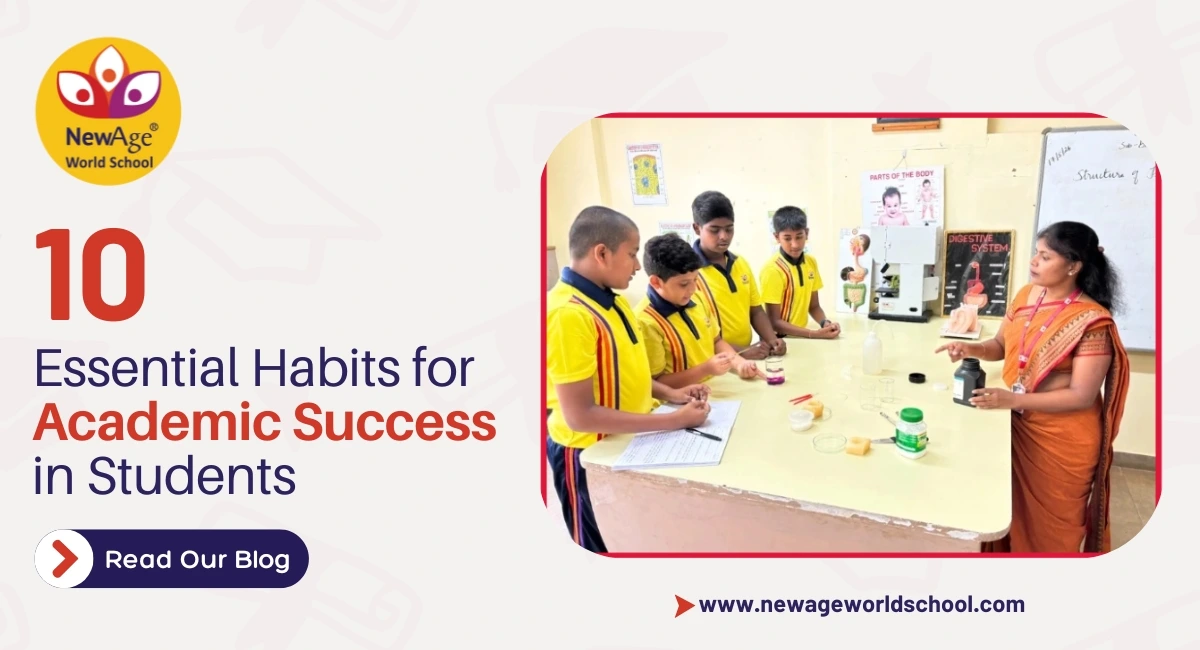Top 10 Essential Habits for Academic Success in Students - 2025

Table of content
1. Introduction
2. Setting Clear Goals and Objectives for Academic Growth
3. Building a Consistent Study Routine at Home and School
4. Staying Organized and Managing Time Effectively
5. Active Participation in Class and School Activities
6. Developing Positive Relationships with Teachers and Peers
7. Practicing Self-Discipline and Focus During Study Time
8. Taking Care of Mental Health and Well-Being
9. Reading Regularly and Expanding Knowledge Beyond Textbooks
10. Seeking Help and Feedback from Teachers and Parents
11. Maintaining a Healthy Balance Between Study and Play
12. Conclusion
13. FAQs
Introduction
We all want to do well in school get good grades, make our parents proud, and feel confident about our future. But success doesn't come overnight. It's built step by step through small, daily habits that shape how we think, learn, and grow. Agree? Great! In this article, we'll explore the essential habits for academic success that every student can follow — simple, practical, and truly effective.
In today's competitive world, understanding the importance of developing good habits for consistent learning is key. Academic success for students is not just about studying harder; it's about studying smarter. Schools like the Best School in Yelahanka guide students to balance academics, health, and personal growth helping them turn good habits into lifelong strengths.
1. Setting Clear Goals and Objectives for Academic Growth
One of the most significant differences between an average and a top-performing student is the clarity of their goals. When you set clear goals, your focus improves, and so does your motivation. Student goal setting helps you understand where you want to go and what steps you need to take to get there.
Whether it's completing your assignments on time or scoring better on the next exam, having a plan matters. Academic excellence habits begin with having a purpose — and every small achievement adds up to bigger success. Write your goals down, stick them near your study area, and revisit them weekly. It's a simple habit that leads to amazing results.
2. Building a Consistent Study Routine at Home and School
If there's one thing all successful students have in common, it's a study routine that works for them. A set schedule helps your brain stay alert and organized. Instead of studying only before exams, divide your syllabus into smaller chunks and review daily.
Good time management skills for students mean planning breaks, recreation, and revision time wisely. Following a routine helps avoid last-minute stress. When studying becomes a habit, it stops feeling like a burden and starts becoming a part of your daily life.
3. Staying Organized and Managing Time Effectively
Disorganization is the silent killer of productivity—students who stay organized save hours every week. Simple habits, such as keeping your notes organized, maintaining a planner, or regularly cleaning your study desk, can make a significant difference.
Strong time management skills enable students to prioritize tasks and reduce procrastination. When your time is well-managed, stress levels drop, and concentration improves. This kind of structure is often encouraged by institutions known for academic success in North Bangalore, where discipline and organization form the base for excellence.
4. Active Participation in Class and School Activities
Learning doesn't happen only by reading — it happens by participating. Whether it's answering questions in class, joining a debate, or volunteering for a project, being involved boosts your confidence and curiosity.
Student engagement helps in a deeper understanding and better memory. Schools that value holistic learning, such as the Best School in North Bangalore, encourage students to explore their talents beyond textbooks. So, raise your hand more often, express your opinions, and be part of your school community — that's how true learning begins.
5. Developing Positive Relationships with Teachers and Peers
Behind every successful student is a strong network of teachers and friends who inspire and support. Building a teacher-student connection allows you to seek help whenever needed and get constructive feedback. Teachers are not just evaluators — they are mentors guiding you toward your best self.
Additionally, never underestimate the role of teachers in a child's development. They shape your confidence, discipline, and communication skills. Being kind and respectful toward your peers also fosters teamwork and empathy — qualities that benefit not only in school but also throughout life.
6. Practicing Self-Discipline and Focus During Study Time
There's no magic formula for success — it's mostly about consistency and control. Habits for student success begin when you can manage distractions and stay focused on the task at hand.
In today's digital world, this is tough. Social media notifications and mobile games constantly steal attention. The solution? Practice small acts of discipline — put your phone aside while studying, follow a fixed time for breaks, and reward yourself after finishing a task. Developing focus and discipline for students takes time, but once mastered, it becomes their strongest asset for lifelong achievement.
7. Taking Care of Mental Health and Well-Being
Grades are important, but not more than your mental peace. Student mental health and well-being should always come first. A tired or anxious mind can't perform at its best.
Schools that truly care about children's growth, like the Best School in Yelahanka, now give equal importance to emotional balance and mindfulness. Practicing gratitude, sharing emotions, and taking time to relax are all essential components of stress management for students. Remember, a healthy mind learns more quickly and retains information better.
8. Reading Regularly and Expanding Knowledge Beyond Textbooks
Reading doesn't just improve vocabulary — it opens doors to imagination and creativity. Reading habits in students build stronger comprehension skills and develop empathy.
Try reading something new every week: a short story, a biography, or even an article about science or history. When you go learning beyond the classroom, you understand how classroom lessons connect to real life. Curiosity is the heart of great learning, and reading keeps that curiosity alive.
9. Seeking Help and Feedback from Teachers and Parents
Some students hesitate to ask for help, thinking it makes them look weak. However, the truth is that seeking help is a sign of maturity. When you share your struggles, teachers and parents can provide you with better guidance.
Parental support in education plays a huge role in a child's progress. A quick conversation with your teacher or parent can save hours of confusion. Teacher guidance for academic success ensures you're always on the right path. Remember, learning is a team effort — and your family and teachers are your strongest teammates.
10. Maintaining a Healthy Balance Between Study and Play
Studying all the time can make you tired, while playing all the time can delay your goals. The secret lies in balance. Both the mind and body need activity and rest.
The importance of physical education cannot be overstated — regular participation in games or sports helps improve focus, energy, and positivity. Schools that focus on the holistic development of students understand this balance perfectly. Play outside, laugh more, and stay active — it helps you perform better when it's time to study.
Conclusion
Success isn't about who studies the longest — it's about who studies the smartest, stays consistent, and keeps a positive attitude. These essential habits for academic success are like tools; use them daily, and you'll see results that last beyond report cards.
Institutions like NewAge World School, nurture these qualities early, helping students become responsible, focused, and confident learners. So, start small today make one good habit stick — and soon you'll find yourself on the path to lifelong academic success.
Frequently Asked Questions
How can students balance study and playtime?
Follow a routine that includes both reading and physical activity. The importance of physical education lies in its ability to keep your body fit and your mind fresh, thereby facilitating better learning.
What is the role of teachers in helping students grow?
Teachers are guides, not just instructors. The role of teachers in child development includes building discipline, confidence, and curiosity in every student.
How can parents support their children's education?
Through open communication, motivation, and understanding. Parental support in education gives students the confidence to perform better and seek help when they need it.
Why is mental health important for students?
Student mental health and well-being directly affect performance. A calm mind enables students to think more clearly, learn more effectively, and remain positive in the face of challenges.
How can schools help students improve their study habits?
Schools can guide students with structure, motivation, and mentoring. For example, schools like NewAge World School focus on discipline, engagement, and stress-free learning.
What are the most important habits for students to achieve academic success?
Some key habits include setting clear goals, managing time, staying organized, and keeping a balance between study and play. Emotional well-being and focus also play a significant role.

















Leave a Reply
Your email address will not be published. Required fields are marked *
Comments
No comments available